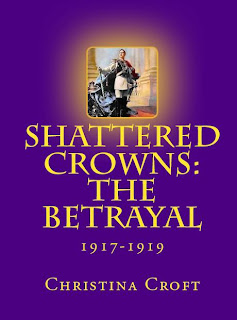For Halloween, here is another true story from the wonderful Princess Marie
Louise, who was undoubtedly naturally gifted with the sensitivity of a psychic.
 The princess recounts a visit to Littlecote, the home of a cousin of her
lady-in-waiting, but formerly the home of the infamous ‘Wild William Darrell’, a
member of the notorious Hell Fire Club. Wild Darrell had, according to legend,
had an affair with a local girl, who was about to give birth to his child.
Darrell took the girl to a room in the house and summoned a midwife whom he
blindfolded before leading her to the room. The moment the baby was born, wicked
Darrell seized the poor child and threw him into the fire. The
midwife, realising something was wrong, cut a piece of chintz from the curtains
surrounding the bed and smuggled it out with her as proof that she had been
present when the event occurred.
The princess recounts a visit to Littlecote, the home of a cousin of her
lady-in-waiting, but formerly the home of the infamous ‘Wild William Darrell’, a
member of the notorious Hell Fire Club. Wild Darrell had, according to legend,
had an affair with a local girl, who was about to give birth to his child.
Darrell took the girl to a room in the house and summoned a midwife whom he
blindfolded before leading her to the room. The moment the baby was born, wicked
Darrell seized the poor child and threw him into the fire. The
midwife, realising something was wrong, cut a piece of chintz from the curtains
surrounding the bed and smuggled it out with her as proof that she had been
present when the event occurred.
Princess Marie Louise goes on to describe her experience at Littlecote. She
was being shown around the house by the owner, Lady Wills, when:

“...we eventually came to the Long Gallery which is supposed to be haunted
by the distracted young mother looking for her baby. As we reached the end of
the gallery Lady Wills pointed to a door in the wall and said, “This is where
the gamp [midwife] came up.” I promptly replied, “Oh no, you are mistaken,” and,
pointing to another door, in the wall said, “This is where she was brought up.”
Then I shut my eyes – why I cannot tell – and walked on a few steps, turned
around and said, “Evelyn, take care, here are two steps so be careful not to
fall.” I pushed open a door in front of me (still with my eyes shut), entered a
small room and again said, “Here is the fireplace where Wild Darrell burnt the
child.” I then crossed the room, took hold of the curtain around the bed, and
pointed to the place where the gamp had cut the bit of chintz. Only then did
I open my eyes and rather bewildered asked how I could have known all that I had
seen and done.”
In her wonderful book: My Memories of Six Reigns, Princess Marie Louise
describes several other equally intriguing experiences.
Happy Halloween!









